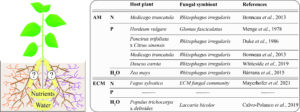Our latest publication is now online!
Congratulations to Arjun, Hannah, and Ben!
Most land plants symbiotically interact with soil-borne fungi to ensure nutrient acquisition and tolerance to various environmental stressors. Among these symbioses, arbuscular mycorrhizal and ectomycorrhizal associations can be found in a large proportion of plants, including many crops. Split-root assays are widely used in plant research to study local and systemic signaling responses triggered by local treatments, including nutrient availability, interaction with soil microbes, or abiotic stresses. However, split-root approaches have only been occasionally used to tackle these questions with regard to mycorrhizal symbioses. This review compiles and discusses split-root assays developed to study arbuscular mycorrhizal and ectomycorrhizal symbioses, with a particular emphasis on colonization by multiple beneficial symbionts, systemic resistance induced by mycorrhizal fungi, water and nutrient transport from fungi to colonized plants, and host photosynthate allocation from the host to fungal symbionts. In addition, we highlight how the use of split-root assays could result in a better understanding of mycorrhizal symbioses, particularly for a broader range of essential nutrients, and for multi-partite interactions.
